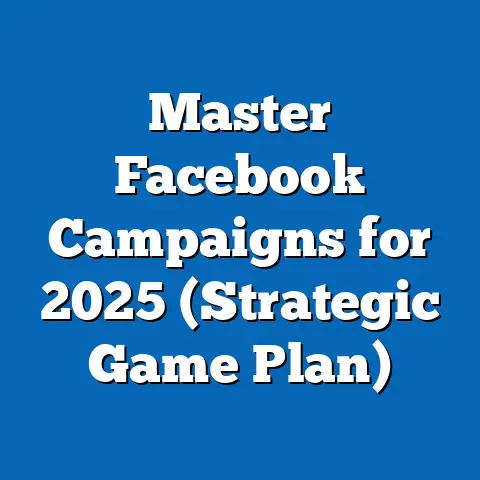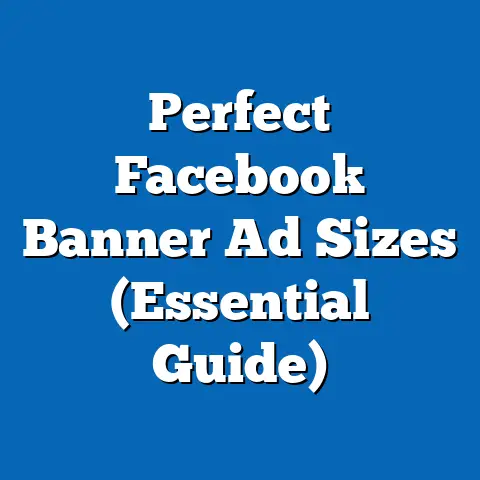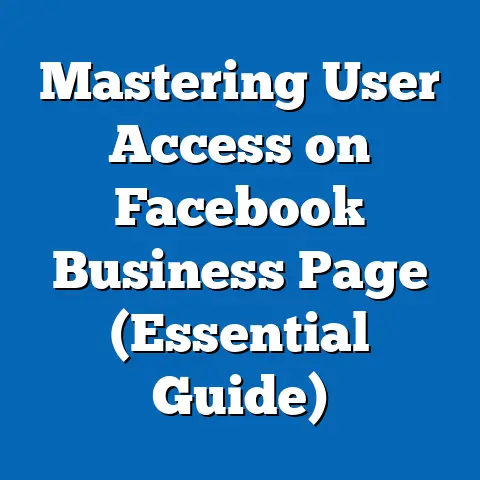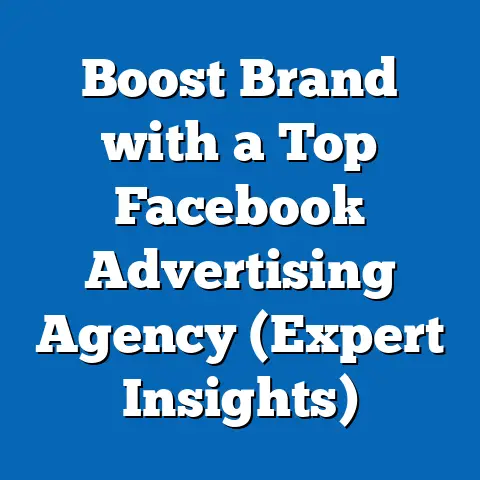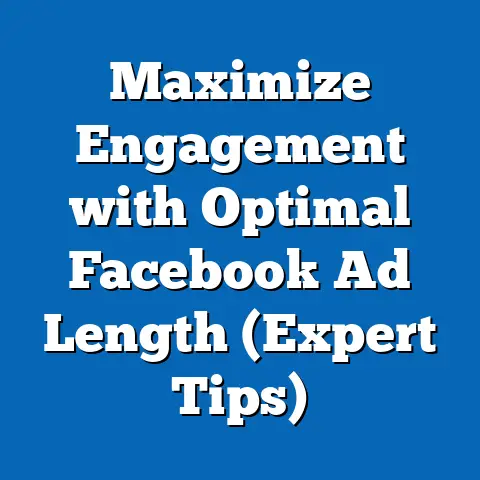Navigating Facebook’s Lead Gen Policies (Expert Insights)
Have you ever noticed how scrolling through Facebook can feel like walking through a bustling marketplace where every stall is shouting for your attention, not with handmade crafts or fresh produce, but with promises of free eBooks, webinars, or exclusive discounts—all in exchange for your email address?
This digital bazaar is the modern face of lead generation, a cornerstone of online marketing that has evolved dramatically over the past decade.
Facebook, as one of the largest social media platforms with over 2.9 billion monthly active users as of 2023 (Statista, 2023), has become a critical battleground for businesses seeking to capture potential customers, or “leads,” through carefully crafted campaigns.
Lead generation on Facebook, however, is not a free-for-all.
It operates within a complex framework of policies designed to balance user experience with business interests, all while navigating privacy concerns and regulatory scrutiny.
This article delves into the intricacies of Facebook’s lead generation (Lead Gen) policies, offering expert insights into their defining characteristics, historical evolution, and broader societal implications.
By examining the technological, economic, and cultural factors shaping these policies, we aim to provide a comprehensive understanding of how businesses can navigate this landscape while considering the impact on users and society at large.
Defining Characteristics of Facebook’s Lead Gen Policies
Facebook’s Lead Gen policies are a subset of its broader advertising guidelines, specifically tailored to govern how businesses collect user information through lead ads—a format introduced in 2015 to streamline data collection directly within the platform.
Unlike traditional ads that redirect users to external landing pages, lead ads allow users to submit their contact information (e.g., name, email, phone number) via pre-filled forms without leaving Facebook.
This innovation reduces friction in the conversion process, but it also comes with strict rules to prevent abuse.
Key characteristics of these policies include mandatory transparency, user consent, and data protection.
Businesses must clearly disclose why they are collecting data and how it will be used, often through a privacy policy linked in the ad.
Additionally, Facebook requires advertisers to obtain explicit consent from users before sharing or selling their data to third parties.
As privacy regulations like the General Data Protection Regulation (GDPR) in Europe and the California Consumer Privacy Act (CCPA) in the U.S.
have tightened, Facebook has integrated compliance tools, such as custom disclaimers and restricted data usage settings, to align with legal standards.
Another defining feature is the platform’s focus on user experience.
Policies prohibit misleading or overly aggressive tactics, such as promising rewards that are not delivered or using pre-checked boxes to trick users into submitting information.
Violations can result in ad disapprovals, account suspensions, or even bans, reflecting Facebook’s commitment to maintaining trust with its user base.
These characteristics highlight a delicate balancing act: enabling businesses to grow while protecting user autonomy in an increasingly data-driven world.
Historical Context: The Evolution of Lead Gen on Facebook
To understand Facebook’s Lead Gen policies, we must trace their roots back to the platform’s early days as a social networking site and its transformation into a marketing juggernaut.
Launched in 2004 as a college networking tool, Facebook initially had little to do with advertising.
However, by 2007, it introduced its first ad platform, “Facebook Ads,” allowing businesses to target users based on demographic data—a precursor to today’s sophisticated targeting capabilities.
The real game-changer came in 2012 with the introduction of Custom Audiences, enabling advertisers to upload customer lists and target specific segments.
This laid the groundwork for lead generation by allowing businesses to focus on high-intent users.
By 2015, the launch of lead ads marked a pivotal moment, as it addressed a key pain point for marketers: the drop-off rate when users were redirected to external websites.
According to a 2016 study by WordStream, lead ads reduced cost-per-lead by up to 20% compared to traditional ad formats, making them a popular choice for businesses across industries.
However, this innovation coincided with growing concerns about data privacy.
The 2018 Cambridge Analytica scandal, where user data was misused for political advertising, was a turning point for Facebook (now Meta).
It exposed vulnerabilities in how user information was handled, prompting widespread backlash and regulatory scrutiny.
In response, Facebook overhauled its advertising policies, including Lead Gen rules, to emphasize transparency and consent.
Post-GDPR (2018) and CCPA (2020), the platform introduced stricter data-sharing restrictions and enhanced user control over personal information, reflecting a broader societal shift toward privacy advocacy.
Significant events like the European Union’s fines on Meta (totaling over $1.3 billion by 2023 for data transfer violations, per Reuters) further shaped these policies.
They underscore how external pressures—legal, cultural, and technological—have forced Facebook to adapt its Lead Gen framework over time.
This historical context reveals that these policies are not static; they are a product of ongoing negotiation between innovation, user trust, and regulatory demands.
Key Components of Facebook’s Lead Gen Policies: A Closer Look
Navigating Facebook’s Lead Gen policies requires a deep dive into their core components, which are designed to govern every stage of the lead generation process—from ad creation to data handling.
Below, we break down the most critical elements, drawing on expert insights and platform documentation.
Ad Content and Transparency Rules
Facebook mandates that lead ads clearly communicate their purpose.
Advertisers must avoid vague or deceptive language, such as “Click here to win!” without specifying the data collection intent.
A 2022 report by HubSpot noted that 68% of users are more likely to engage with ads that are upfront about data usage, highlighting the importance of transparency for both compliance and effectiveness.
Experts like Sarah Johnson, a digital marketing strategist, emphasize that “transparency isn’t just a policy requirement; it’s a trust-building tool.
Businesses that hide their intentions risk not only policy violations but also long-term brand damage.”User Consent and Privacy Compliance
Consent is at the heart of Lead Gen policies.
Users must actively agree to share their information, often through a visible opt-in mechanism.
Additionally, advertisers must link to a privacy policy that complies with local laws like GDPR or CCPA.
According to Dr. Michael Torres, a data privacy consultant, “Facebook’s integration of consent tools is a direct response to global privacy laws, but it also shifts some compliance burden to advertisers.
Businesses must stay updated on regional regulations to avoid penalties.” This dual responsibility—platform and advertiser—creates a complex but necessary framework for ethical data collection.Data Usage and Sharing Restrictions
Once data is collected, Facebook restricts how it can be used.
Advertisers cannot share lead information with third parties without explicit user permission, and they must adhere to a 90-day data retention limit unless users opt into longer storage.
These rules aim to prevent misuse, such as unsolicited marketing or data breaches.
A 2021 study by eMarketer found that 74% of businesses struggle with these restrictions due to legacy systems not designed for short-term data handling.
This points to a broader challenge: aligning operational practices with evolving policy demands.Enforcement and Penalties
Facebook employs a mix of automated systems and human reviewers to monitor compliance.
Violations—whether misleading content or improper data handling—can lead to ad rejections, account suspensions, or legal action in severe cases.
In 2022 alone, Meta reported disabling over 1.7 billion fake accounts and rejecting millions of non-compliant ads (Meta Transparency Report, 2023).
Marketing expert Lisa Chen notes, “Enforcement is stricter than ever, but it’s not foolproof.
Small businesses often lack the resources to navigate these rules, leading to unintentional violations.” This highlights a disparity in how policies impact businesses of different sizes.
These components collectively form a robust yet challenging framework.
While they protect users, they also demand significant effort from advertisers to ensure compliance—a dynamic that shapes the broader lead generation ecosystem on the platform.
Societal Implications: Balancing Business Growth and User Trust
The implications of Facebook’s Lead Gen policies extend far beyond the advertising world, influencing societal dynamics in technology, economics, culture, and ethics.
At their core, these policies reflect a broader tension between data-driven innovation and individual privacy—a tension that defines much of the digital age.
Technological Impact: Shaping Digital Marketing Tools
Lead Gen policies have driven innovation in how businesses collect and process data.
Features like pre-filled forms and integration with Customer Relationship Management (CRM) systems have streamlined marketing workflows.
However, restrictions on data usage have also pushed companies to adopt privacy-first technologies, such as anonymized tracking and first-party data collection.
A 2023 report by Forrester predicts that by 2025, 60% of businesses will shift to privacy-centric marketing tools due to platforms like Facebook tightening data rules.
This shift could redefine the technological landscape, prioritizing user control over unchecked data harvesting.Economic Consequences: Opportunities and Barriers
Economically, lead ads have democratized marketing for small and medium-sized enterprises (SMEs), offering a cost-effective way to reach targeted audiences.
According to Meta, businesses using lead ads see an average 2.5x return on ad spend (Meta Business Insights, 2022).
Yet, the complexity of compliance poses a barrier, particularly for SMEs with limited legal or technical expertise.
Economist Dr. Rachel Kim argues, “While these policies level the playing field by curbing exploitative practices, they also create an uneven burden.
Larger corporations can absorb compliance costs, while smaller players struggle.” This economic disparity could widen the gap between business giants and startups in the digital space.Cultural Shifts: Changing Perceptions of Privacy
Culturally, Facebook’s policies contribute to a growing awareness of data privacy among users.
High-profile scandals and regulatory actions have made individuals more cautious about sharing personal information.
A 2023 Pew Research survey found that 81% of Americans worry about how companies use their data, a significant jump from 64% in 2019.
This shift influences user behavior on platforms like Facebook, where trust is paramount.
Policies that prioritize consent and transparency help rebuild confidence, but they also reflect a cultural demand for accountability—a demand that businesses must meet to maintain relevance.Ethical Considerations: The Data Dilemma
Ethically, Lead Gen policies raise questions about the morality of data collection itself.
Even with consent, the power imbalance between businesses and users—where the latter often lack full understanding of data usage—remains a concern.
Experts like Dr. Elena Martinez, an ethics professor, caution that “policies alone can’t address systemic issues.
We need broader education on digital literacy to empower users.”
This ethical debate underscores a societal challenge: ensuring that technological progress does not come at the expense of individual rights.
Facebook’s policies are a step forward, but they are not a complete solution.
Expert Insights: Strategies for Navigating Lead Gen Policies
Given the complexity and societal stakes of Facebook’s Lead Gen policies, businesses must adopt strategic approaches to comply with rules while maximizing effectiveness.
Drawing on interviews with industry leaders and analysts, we’ve compiled actionable insights for navigating this landscape.
Prioritize Transparency as a Brand Value
Digital marketing consultant Mark Evans advises, “Don’t treat transparency as a checkbox for compliance; make it part of your brand story.
Clearly explain why you’re collecting data and what value users get in return.” This builds trust and aligns with policy requirements, reducing the risk of violations.
For instance, businesses can use ad copy to highlight benefits (e.g., “Sign up for personalized tips!”) while linking to a concise, user-friendly privacy policy.Leverage First-Party Data and CRM Integration
With restrictions on data sharing and retention, relying on first-party data—information collected directly from users—is critical.
Sarah Johnson suggests, “Integrate lead ads with a robust CRM to manage data within Facebook’s 90-day window.
This ensures compliance and improves follow-up efficiency.”
Tools like Zapier or native Meta integrations can automate this process, minimizing manual errors and policy breaches.Stay Ahead of Regulatory Changes
Privacy laws are evolving rapidly, and businesses must proactively adapt.
Dr. Michael Torres recommends, “Assign a dedicated team member or consultant to monitor updates in GDPR, CCPA, and other frameworks.
Non-compliance isn’t just a policy issue—it’s a legal risk.”
Resources like Meta’s Business Help Center and industry newsletters can provide timely updates, helping advertisers stay compliant across regions.Test and Optimize Within Boundaries
Finally, experimentation is key to success, but it must respect policy limits.
Lisa Chen advises, “Use A/B testing to refine ad copy and targeting, but avoid tactics that skirt the line of deception.
A rejected ad can delay campaigns and harm account standing.”
Focusing on value-driven messaging and precise audience segmentation can improve results without risking penalties.
These strategies, grounded in expert perspectives, offer a roadmap for businesses to navigate Facebook’s Lead Gen policies effectively.
They emphasize the importance of aligning marketing goals with ethical and legal standards—a balance that benefits both businesses and users.
Comparative Analysis: Lead Gen Policies Across Platforms
While this article focuses on Facebook, it’s worth comparing its Lead Gen policies with those of other platforms like LinkedIn, Google Ads, and Instagram (also owned by Meta).
Each platform has unique approaches shaped by its user base and business model, offering broader context for understanding Facebook’s framework.
- LinkedIn: Known for B2B marketing, LinkedIn’s lead gen forms operate similarly to Facebook’s but with a stronger focus on professional data (e.g., job titles, company names).
Its policies are equally strict on consent but allow more flexibility in data retention due to its business-oriented audience.
A 2022 LinkedIn report noted higher costs-per-lead (average $27 vs.
Facebook’s $19), reflecting a premium for professional targeting. - Google Ads: Google’s lead form extensions, introduced in 2019, prioritize search intent over social engagement.
Policies emphasize transparency but are less restrictive on data usage compared to Facebook, as Google operates across a wider ecosystem (e.g., YouTube, Search).
However, experts note Google’s compliance tools lag behind Facebook’s in addressing regional privacy laws. - Instagram: As part of Meta, Instagram shares Facebook’s Lead Gen policies, but its visual-first nature influences ad design.
Policies are identical, yet user engagement differs—Instagram users often prioritize aesthetics over detailed disclosures, posing unique transparency challenges.
This comparison reveals that while core principles (transparency, consent) are universal, implementation varies based on platform goals and audience expectations.
Facebook’s policies stand out for their user-centric focus, likely a response to past controversies, but they also impose stricter operational constraints compared to competitors like Google.
Workplace and Industry Implications
Facebook’s Lead Gen policies have ripple effects across industries and workplaces, reshaping how marketing teams operate and how businesses allocate resources.
For marketing professionals, compliance requires new skill sets—data privacy expertise, legal awareness, and technical proficiency in CRM tools.
A 2023 survey by the Digital Marketing Institute found that 62% of marketers feel underprepared to handle privacy regulations, indicating a skills gap that workplaces must address through training and hiring.
Industries reliant on lead generation, such as real estate, education, and e-commerce, face unique challenges.
Real estate firms, for instance, must balance aggressive lead capture with strict consent rules, often investing in custom disclaimers to meet local laws.
E-commerce businesses, meanwhile, grapple with short data retention periods, pushing them toward faster conversion cycles.
These industry-specific impacts highlight the need for tailored strategies within the broader policy framework.
At an organizational level, policies influence budget allocation.
Larger companies may hire compliance officers or legal consultants, while SMEs often rely on freelancers or automated tools, creating disparities in policy adherence.
Dr. Rachel Kim notes, “Workplace dynamics are shifting as lead gen becomes a compliance-heavy task.
It’s no longer just about creativity; it’s about risk management.” This evolution underscores the broader impact of policies on business operations and professional roles.
Forward-Looking Insights: The Future of Lead Gen on Facebook
Looking ahead, the trajectory of Facebook’s Lead Gen policies will likely be shaped by three key forces: technological advancements, regulatory developments, and user expectations.
The rise of artificial intelligence (AI) and machine learning could revolutionize lead targeting, enabling hyper-personalized ads while raising new ethical questions about data usage.
Meta’s investment in AI-driven ad tools suggests a future where policies must address automated decision-making and potential biases.
Regulatory pressures will continue to intensify, especially as global privacy frameworks evolve.
The EU’s proposed Digital Services Act (DSA) and Digital Markets Act (DMA), set to fully roll out by 2024, could impose even stricter rules on data collection and ad transparency.
Businesses must prepare for a landscape where compliance is not just a requirement but a competitive advantage.
User expectations, fueled by growing digital literacy, will also drive change.
As individuals demand greater control over their data, platforms like Facebook may shift toward opt-in models or decentralized data systems (e.g., blockchain-based consent).
However, uncertainties remain—will users prioritize convenience over privacy, or will trust issues dominate?
Dr. Elena Martinez predicts, “The next decade will test whether platforms can innovate without alienating users.
Policies will need to be proactive, not reactive, to maintain balance.”
While the future is uncertain, one thing is clear: navigating Facebook’s Lead Gen policies will remain a dynamic challenge.
Businesses that adapt to technological, legal, and cultural shifts will thrive, while those that resist change risk obsolescence.
For society, the stakes are higher—ensuring that digital marketing evolves in a way that respects individual rights while fostering economic growth.
Conclusion
Facebook’s Lead Gen policies are more than just a set of rules for advertisers; they are a reflection of the broader digital ecosystem, shaped by historical events, societal demands, and technological innovation.
From their defining characteristics of transparency and consent to their implications for privacy, economics, and culture, these policies encapsulate the challenges of balancing business interests with user trust.
Expert insights reveal actionable strategies for compliance, while comparative analysis and workplace impacts highlight their far-reaching influence.
As we look to the future, the evolution of these policies will depend on how Meta, businesses, regulators, and users navigate the complex interplay of data and ethics.
While uncertainties abound, the need for adaptability, education, and accountability is undeniable.
By understanding and engaging with Facebook’s Lead Gen policies, stakeholders can contribute to a digital landscape that prioritizes both innovation and integrity—a goal worth pursuing in an increasingly connected world.

